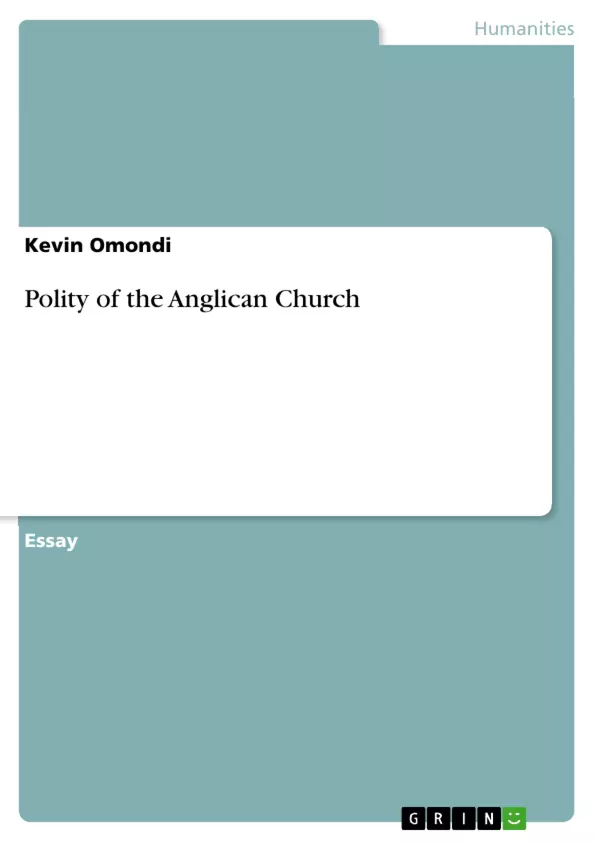The church's polity or governance is a branch of ecclesiology or study of the church that addresses the organizational structure and hierarchy of the church. Issues of Church governance appear in the first chapter of the book of Acts of Apostles, the first act recorded after the accession in the election of Mathias as one of the Twelve Apostles replacing Judas Iscariot (Acts 1:12-26). This assignment explains the historical development that led to the polity of the Anglican Church highlighting the denominational history and local history that have influenced its choice of polity, comparing and contrasting this polity with Biblical teaching on church governance, and the impact of Anglican Church polity on assimilation and involvement of church members.
Table of Contents
- Polity of the Anglican Church
- The Church, Ecclesia, and Church Polity
- The Anglican Church: Episcopal Polity
- Special Features of the Anglican Church
- Titles of Anglican Church Officials
- The Anglican Church: Structure and Governance
- The Anglican Church: Sacraments
- Comparison of Anglican Polity and the Bible: The Bishop
- Comparison of Anglican Polity and the Bible: The Deacon
- Comparison of Anglican Polity and the Bible: The Ordination of Priests
- Comparison of Anglican Polity and the Bible: Membership
Objectives and Key Themes
This assignment explores the historical development and structure of the Anglican Church's polity. It examines the historical and denominational influences on the Church's governance system and compares its structure to biblical teachings on church governance. Furthermore, the assignment investigates the impact of Anglican Church polity on the assimilation and involvement of church members.
- Historical development of Anglican Church polity
- Comparison of Anglican Church polity with biblical teachings on church governance
- Influence of Anglican Church polity on church member involvement
- Structure and governance of the Anglican Church
- Key figures and roles within the Anglican Church hierarchy
Chapter Summaries
- Polity of the Anglican Church: This chapter introduces the concept of church polity and its significance within ecclesiology. It highlights the historical context of church governance, tracing its origins back to the book of Acts.
- The Church, Ecclesia, and Church Polity: This chapter defines the term "church" and explores its etymology, tracing the word back to the Ancient Greek term "Eккλŋσía". It discusses the meaning of "ecclesia" in both local and universal contexts, highlighting the concept of a "called out" assembly.
- The Anglican Church: Episcopal Polity: This chapter describes the Anglican Church's governance structure as an Episcopal polity, highlighting its hierarchical nature and the authority vested in bishops. It explains the origins of the term "episcopacy" and its connection to the Greek word "episkopos", meaning "bishop" or "overseer".
- Special Features of the Anglican Church: This chapter outlines distinctive features of the Anglican Church, including its emphasis on holy orders, the authority of Scripture, the importance of tradition, and its use of the Book of Common Prayer. It also discusses the Anglican Church's structure, which is divided into provinces, dioceses, and parishes.
- Titles of Anglican Church Officials: This chapter provides a detailed overview of the various titles and roles within the Anglican Church hierarchy, from Archbishop to Curate. It outlines the responsibilities and functions associated with each position.
- The Anglican Church: Structure and Governance: This chapter examines the organizational structure and governance practices of the Anglican Church. It discusses the roles of boards, committees, and elected members in decision-making processes, highlighting the involvement of the congregation in church governance.
- The Anglican Church: Sacraments: This chapter explores the sacraments recognized by the Anglican Church, namely baptism and confirmation. It defines the concept of sacraments and their significance in Christian worship, drawing on the teachings of Augustine and the Book of Common Prayer.
- Comparison of Anglican Polity and the Bible: The Bishop: This chapter analyzes the concept of the bishop within the Anglican Church's structure and compares it to biblical teachings. It examines the role of James in the early church, as described in Luke 15, and questions whether his authority aligns with the modern concept of a territorial bishop.
- Comparison of Anglican Polity and the Bible: The Deacon: This chapter compares the role of the deacon in the Anglican Church to the biblical account of the seven deacons appointed in Acts 6. It discusses the differences in function and purpose between the Anglican deacon and the biblical model, highlighting the role of lay ministers in the Anglican Church.
- Comparison of Anglican Polity and the Bible: The Ordination of Priests: This chapter compares the Anglican Church's process of selecting and ordaining priests to the biblical account of the appointment of the seven men in Acts 6. It discusses the significance of the laying on of hands in both contexts and highlights the differences in qualifications and gender inclusion.
- Comparison of Anglican Polity and the Bible: Membership: This chapter examines the concept of membership within the Anglican Church and compares it to the biblical account of the growth of the early church, as described in Acts 2. It discusses the criteria for membership in the Anglican Church and its emphasis on baptism and confirmation.
Keywords
Key terms and concepts explored in this work include Anglican Church, church polity, ecclesiology, Episcopal polity, bishop, deacon, priest, ordination, sacraments, baptism, confirmation, governance, structure, membership, historical development, biblical teachings, and assimilation.
- Quote paper
- Mr. Kevin Omondi (Author), 2022, Polity of the Anglican Church, Munich, GRIN Verlag, https://www.hausarbeiten.de/document/1331102


